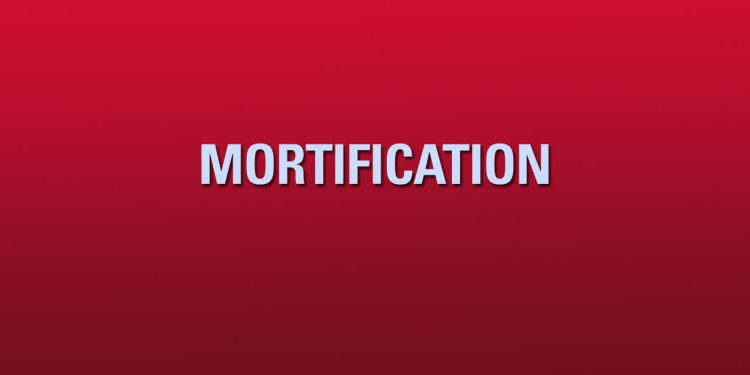Mortification by Mark Watson – Review

By Helen Johnston
It seemed a sad coincidence that on the day after I finished reading comedian Mark Watson’s account of his over-reliance on alcohol to get through his darkest days, it was announced Friends actor Matthew Perry had been found dead at his LA home.
Both men’s honesty about their struggles are a stark reminder that fame and a talent for making other people laugh don’t protect you from the same insecurities and frailties the rest of us have. In fact, they can make you more vulnerable. Smokey Robinson’s ‘Tears of a Clown’ had it bang on with the line: “If there’s a smile on my face, it’s only there trying to fool the public”.
Having said that, Watson’s book is not a depressing one. Far from it. His writing is extremely well observed and very funny. He made me laugh out loud several times. For instance, when he pokes fun at some of the platitudes people come out with, like “everything happens for a reason”, Watson’s retort is: “I don’t think I’d want to say it to someone who’d just seen their brother fall into the Grand Canyon.”
His self-deprecating wit and ability to find a one-liner in grim situations leaps from every page, making this a book I read in virtually one sitting (rare for me these days). He begins with a chapter called What’s It Like When You Die?, which you’ve probably guessed is about dying on stage rather than the very final farewell. (Although he does discuss the extinction of life in the epilogue).
His first experience of dying on stage was in Maidstone, Kent, when someone at the back suggested he “Get Off!” less than two minutes after he’d started. He was mortified. Hence the title of this memoir.
It’s to Watson’s credit that he’s prepared to share his excruciatingly embarrassing failures, making non-showbusiness readers like me feel glad that their own mortifying moments haven’t been on a stage in front of a large audience. Although some of Watson’s other uncomfortable experiences have been precisely because of a lack of a large audience.
His career as a stand-up hasn’t been plain sailing and he’s refreshingly honest about those TV panel shows which some comedians seem to do on a never-ending circuit. In fact, he hated doing them and felt he’d somehow let himself down by taking part.
He also makes some barbed comments about a charity show where the un-named millionaire host urging viewers to give of their hard-earned cash, kept fluffing his line about children dying from poverty. The result was laughter from the studio audience.
“Cathartic exercise”
 Watson also reveals how one high-profile comedian (also un-named) had a team of writers to put together a list of ‘spontaneous’ one-liners for him to deliver. Showing the behind-the-scenes workings of these shows probably won’t get Watson any repeat invitations, but I don’t think that will bother him in the slightest.
Watson also reveals how one high-profile comedian (also un-named) had a team of writers to put together a list of ‘spontaneous’ one-liners for him to deliver. Showing the behind-the-scenes workings of these shows probably won’t get Watson any repeat invitations, but I don’t think that will bother him in the slightest.
The vileness of people on social media is also exposed, with even self-proclaimed ‘fans’ slinging mud at him when they feel he’s failed them in some way. One particularly despicable commenter wished harm on his unborn baby.
Thankfully, Watson isn’t one of those celebrities who issues us with a list of rules for how to achieve some kind of nirvana in our own lives. He rails against the notion of advising people how to ‘win at life’ and is suspicious of anyone who believes they’ve “left behind their foolish old ways and ‘grown’ as individuals to the point that they have something to teach the rest of humanity”.
He admits that at particularly dark moments he has thought that life might be too much of a struggle to carry on with, which is the subject of his novel Contacts. By sheer coincidence, that was a book I borrowed from the library earlier this year, not realising at first that the author Mark Watson was one and the same as the comedian Mark Watson. (It’s a great read, so get that too if you can.)
It feels as though this memoir was a cathartic exercise, to try to expel some of the worst memories of mortification, failure, and disappointments he’s endured, and to make some kind of peace with them. Some incidents still rankle though, like working on a film script day and night in a collaboration that went on for four years but which came to nothing when he was ghosted by the other people involved.
I got the impression Watson is a perfectionist. He admits how he used to see life as a competition, constantly comparing himself with other comedians and their successes. Matthew Perry said much the same thing in the Friends’ reunion show, revealing how he struggled with a fear of failure whenever one of his co-stars got a bigger laugh from the studio audience than he did.
Watson uses the analogy of life as a piece of music with “unexpected changes of tempo” that we have to learn to dance along to. He’s a talented writer and long may he dance to his own tune.
‘Mortification’ by Mark Watson is published by Orion









